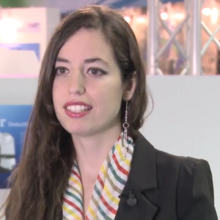Victoria Alonsoperez | |
|---|---|
 | |
| Born | 1986 or 1987 (age 36–37)
[1] |
| Nationality | Uruguayan |
| Occupation(s) | Telecoms engineer, entrepreneur |
| Notable work | Chipsafer |
Victoria Alonsoperez is an Uruguayan electronics and telecommunication engineer and entrepreneur. She invented Chipsafer, a software platform to track cattle, and remotely and autonomously detect anomalies in their behaviour.
Early life
María Victoria Alonsoperez was born in Uruguay. [1] She studied electrical and space engineering at the University of the Republic in Montevideo. [1] [2] [3] For her undergraduate thesis, she worked on system designs for the first Uruguayan satellite. In 2009, Alonsoperez was awarded a youth grant from the International Astronautical Federation which allowed her to participate in several astronautical congresses and become involved in the Space Generation Advisory Council. In 2011, she attended a space studies program at the International Space University and participated in a group competition, winning the Barcelona Zero-Gravity Aerobatics Challenge with two colleagues. [2] [4] She pursued a graduate degree in aerospace engineering, the first Uruguayan to study in the field. [5]
Career
As a twelve-year-old-child, Alonsoperez invented a monitoring system to track the behavior of cattle, which could be used to prevent a repeat disaster of the 2001 Foot-and-mouth disease outbreak. Eleven years later, while working as a teaching associate the International Space University, she heard of the International Telecommunication Union's Young Innovators Competition. Alonsoperez developed her idea into a product called Chipsafer, sent it to the competition, and won. [6] In 2013, Alonsoperez won the Best Young Inventor Award from the World Intellectual Property Organization. [7] In 2014, the Inter-American Development Bank named Chipsafer the Most Innovative Startup of Latin America and the Caribbean, and the MIT Technology Review selected her as the Innovator of the Year for Argentina and Uruguay. [8]
One of the benefits of winning the competition was a course in entrepreneurship, where Alonsoperez learned how to set up a development company and create a prototype. She founded IEETech and with seed money from the Uruguayan National Research and Innovation Agency, Alonsoperez developed the prototype, tested it and moved into commercializing Chipsafer. [9] Once the prototype was created, Alonsoperez began to search for investors to buy the device for broad scale testing. [10] The device is a type of solar-powered collar which sends data to IEETech's servers which then analyze the data to detect anomalies. Servers can modify the information received or update function remotely, and cattle owners can modify data and desired output for customized reports. [3] In 2015, Alonsoperez partnered with local farmers and the University of the Republic for further testing and as a way to build relationships [6] and later that year was nominated as one of the most inspirational women of the year by they BBC 100 Women series. [1]
In 2016, Alonsoperez has been working to attract investor capitalists from Silicon Valley, [11] after an initial product consultation in China proved difficult. [12]
References
- ^ a b c d "Victoria Alonsoperez, 28, Uruguay - BBC News". Bbc.co.uk. 16 November 2015. Retrieved 8 December 2016.
- ^ a b "SGAC Announces the Barcelona Zero-G Aerobatics Challenge Winners". Space Generation. Geneva, Switzerland: Space Generation Advisory Council. 6 November 2011. Archived from the original on 6 January 2016. Retrieved 10 December 2016.
- ^ a b Zafra, Elena (2014). "Victoria Alonsopérez, 27". MIT Technology Review (in Spanish). Cambridge, Massachusetts. Retrieved 10 December 2016.
- ^ "International Women In The News: Victoria Alonsoperez". Gravitas Magazine. Sarasota, Florida: Fuse Media Publications. 2014. Archived from the original on 6 April 2016. Retrieved 10 December 2016.
- ^ Cotelo, Emiliano (19 December 2013). "María Victoria Alonsopérez: una emprendedora joven, su aporte al agro y los proyecto" (in Spanish). Montevideo, Uruguay: Espectador. Retrieved 10 December 2016.
- ^ a b "Smart Agriculture – Using Location to Protect Food Sources". WIPO. Geneva, Switzerland: World Intellectual Property Organization. 20 July 2016. Archived from the original on 16 November 2016. Retrieved 10 December 2016.
- ^ "Thailand : Youth Innovation Day at ITU Telecom World 2013 Showcases Technical Ingenuity". Mena Report. 22 November 2013. Archived from the original on 18 November 2018. Retrieved 10 December 2016 – via HighBeam Research.
- ^ "Victoria Alonsoperez | Iaf". Iafastro.org. Retrieved 8 December 2016.
- ^ Noel Domínguez, María (22 June 2015). "Conocé la historia de Victoria Alonsoperez, una ingeniera de 27 años que buscó eliminar la aftosa" [Know the story of Victoria Alonsoperez, a 27-year-old engineer who sought to eliminate foot-and-mouth disease]. Portal Montevideo (in Spanish). Montivideo, Uruguay. Retrieved 10 December 2016.
- ^ Lima, Joao (12 April 2016). "Cows, air pollution & UFOs: 5 IoT monitoring solutions seeking seed funding". London, England: Computer Business Review.
- ^ García-Robles, Susana (24 November 2016). "Emprendedoras de America Latina en la mira de Silicon Valley". Analítica (in Spanish). Venezuela: Arawato Media CA. Archived from the original on 25 November 2016. Retrieved 10 December 2016.
- ^ Malvasio, Gabriela (1 January 2016). "Con la cabeza en las estrellas" [With her head in the stars]. El Observador (in Spanish). Montevideo, Uruguay. Archived from the original on 5 March 2016. Retrieved 10 December 2016.